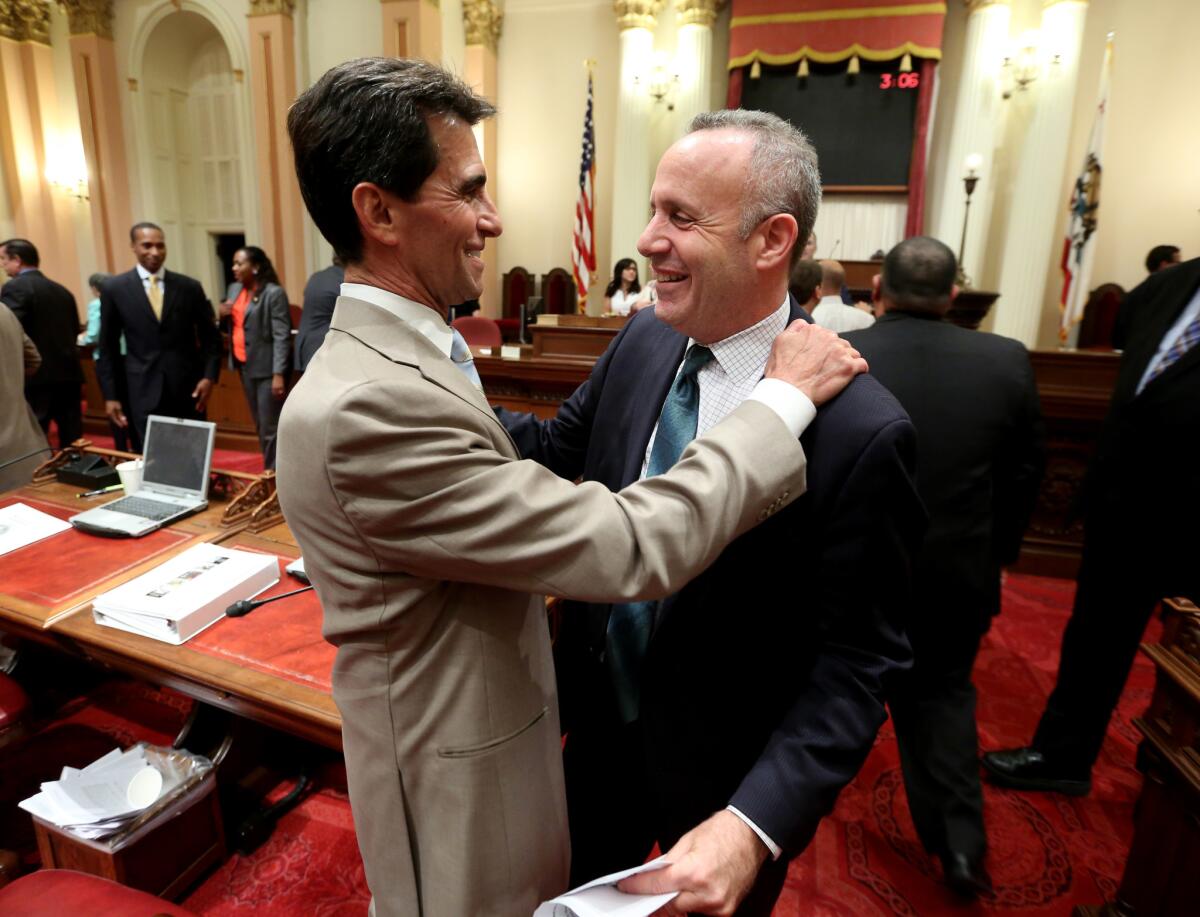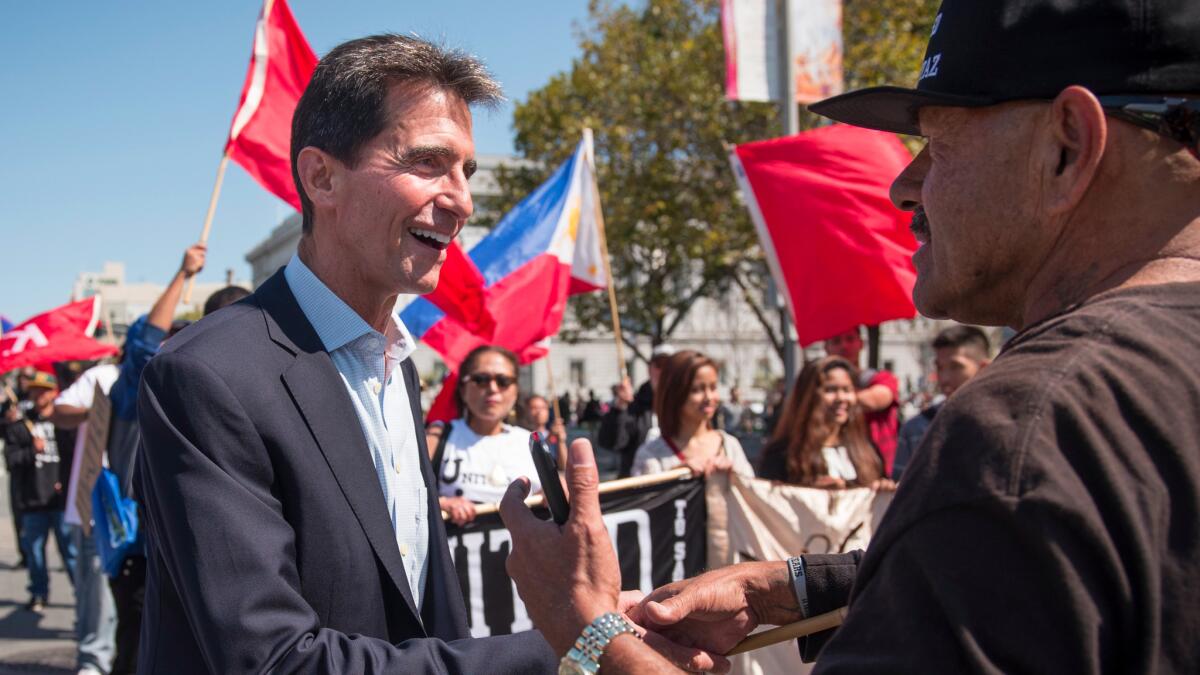Even rivals say Mark Leno is one of Sacramento’s most accomplished lawmakers. Now, his time is up.
- Share via
Mark Leno flashes a broad smile when a conversation about his political legacy pivots to an earlier part of his life, when he was a restless young man who abruptly decided to walk away from rabbinical school without any plan for what would come next.
“My friend gave me a T-shirt that year for Hanukkah that said, ‘Rebbe Without A Cause,’” Leno said with a laugh.
To know him is to get the joke: This is a man full of causes, ones for which the Democrat has patiently and passionately advocated during a 14-year career in the California Legislature that’s now coming to a close.
“If there's a theme throughout this, it’s that I fight for the underdog,” Leno said. “Whoever that underdog may be."
Through the years, his causes have often led to substantive change, in part because of what friends and even foes agree is his unmatched perseverance. Leno, the author of 161 laws, rarely gives up.
In almost all of his celebrated achievements — this year’s deal to boost California’s minimum wage to $15 an hour, to require police search warrants to access electronic devices or Internet service providers, more probation services for felons — the fight took years. Some efforts, such as one of the nation’s first efforts at single-payer universal healthcare, may never come to fruition.
Leno is undaunted.
“You just chip away, year after year after year,” he said. “You start getting some cracks in that wall, and then sometimes circumstances change.”
Get the latest news on what's happening in California politics »
Forced out of office by term limits, the state senator who championed an expansion of gay rights, reform of the prison sentencing system and new warnings on flame-retardant chemicals in furniture has no idea what comes next.
With no immediate political office waiting in the wings, Leno, 65, will return this fall to San Francisco and the neighborhood small business he started in 1978.
“I’ve never been kicked out of any place in my life,” he said with a quick laugh. “So this is a new phenomenon.”
Leno is in many ways a throwback to a different era. From his crisp shirts and suits to his devotion to decorum, he stands out in a political environment where the goal is often to dominate rather than legislate. Never one to hide his identity as a gay man and an unabashed liberal, he has won admirers in both parties.
In June, after he presented his final state spending plan as budget chairman, the entire Senate rose for a long and loud ovation. As many Republicans as Democrats praised him.
Leno’s penchant for civility has not faded even when fiercely advocating for a cause that inflames passions under the Capitol dome.
“He’s not afraid to have a fight,” said Democrat Darrell Steinberg, the former president pro tem of the state Senate. “But he has the rare ability to fight while also maintaining a grace about himself, and an intellect to go with it.”

Or as the current Senate leader, Kevin de León (D-Los Angeles), puts it: Leno’s impact on California has been “enormous.”
Perhaps his most consistent battle has been for the rights of lesbian, gay, bisexual and transgender Californians. Leno, one of the first two openly gay men elected to the Legislature, wrote laws to expand bans on housing and employment discrimination as well as workplace benefits for transgender employees. And perhaps most visibly, he wrote the 2005 bill to legalize same-sex marriages, a bill former Gov. Arnold Schwarzenegger vetoed.
“There is no legislator in the country who has done more to advance LGBT rights than Mark Leno,” said Geoff Kors, a friend and longtime gay rights advocate who is now a city councilman in Palm Springs.
“Mark’s not the person who plays public hardball politics,” Kors said. “He’s the person who talks one-on-one with everyone to make his case.”
That skill was probably well-honed as a child.
"I was a skinny little kid who could never have won a physical altercation if I had one,” he said. “You learn how to get along with people when you need to."

Leno was born in Milwaukee, Wis., to first-generation Americans, a family of Eastern European Jews who immigrated to the United States in 1915. He left Milwaukee after high school and headed for New York City and the chance to freely live his life as a gay man.
That conflicted with plans to become a rabbi. Leno couldn’t reconcile the chaste world of religious leadership with the liberated nightlife provided by Manhattan in the 1970s. He admits he had “no aspirations” once rabbinical school faded away. And after a series of odd jobs, including a brief stint as an office assistant to singer Art Garfunkel (they coincidentally met on an airplane), his youngest sister suggested he move west to San Francisco.
It was not an easy transition, but he made up for it with enthusiasm. A small loan led him to open a sign-printing store, and the business’ success gave him entry into volunteering in local politics.
John Whitehurst, his campaign manager for legislative races in 2002 and 2008, said the story of Leno’s arrival in San Francisco has uncanny parallels to that of the late Harvey Milk, another gay man who left New York to open a small business in San Francisco and then launched a historic career in politics.
Leno never got to meet Milk before the activist’s assassination in 1978. But he later occupied the same seat on the San Francisco Board of Supervisors and wrote the 2009 law that created an annual Harvey Milk Day in the state. Photos of the slain leader adorn Leno’s office.
“What I attribute to Harvey was a burning desire to break a glass ceiling,” Leno said. “Who he was, and the symbol he has become, was a great motivator.”
Mark’s not the person who plays public hardball politics. He’s the person who talks one-on-one with everyone to make his case.
— Geoff Kors, a longtime gay rights advocate, on Sen. Mark Leno's political style
Even so, Leno was a bit of an accidental politician. His community activism helped him catch the eye of Willie Brown, who as San Francisco’s mayor appointed him to a vacant supervisor’s seat in 1998.
He was elected to the Assembly in 2002 and arrived in Sacramento with hopes of leading a powerful legislative committee. His assignment, chair of the Assembly’s public safety committee, included killing crime and punishment bills that Democrats didn’t like. In 2006, he tried instead to reach across the aisle and collaborate on one of those bills.
It came close to costing him his political career.
Leno huddled with Republican lawmakers for weeks with the hope that he could stave off a statewide ballot measure cracking down on sex offenders, believing the Legislature could craft a better version.
But a dispute over punishment for child pornography left him in the uncomfortable position of trying to negotiate an acceptable number of explicit photos on a person’s computer hard drive — a discussion that began only by his worry that an unintentional download could unfairly send someone to prison.
With what he believed to be a bipartisan deal in hand, Leno brought the bill up for a vote. Democrats, trusting his lead, voted yes. Republicans surprised him by refusing to vote. It was a painful lesson.
“Sometimes, it’s not about solving a problem. It’s about making a point,” he said. “It turned out they only wanted to go to the ballot,” a measure that became Proposition 83, known as “Jessica’s Law.”
It then got worse. A press release from the California Republican Party castigated him for approving of “child porn,” and rivals in San Francisco whispered the same messages when he announced he would run against a fellow Democrat, then-state Sen. Carole Migden, in 2008.
Luckily for Leno, his political strengths were too much for Migden. And the Senate seat he won came with perhaps the biggest assignment of all, chairing the powerful budget committee. It put him face-to-face with Schwarzenegger, with whom Leno sparred on several issues.
Even now, the affable Leno rarely passes on an opportunity to excoriate the record of the former governor. Leno often points out Schwarzenegger’s 2003 campaign to rescind the recession-sparked increase in the state’s vehicle license fee. It blew a multibillion-dollar hole in the state budget, and Leno said the ensuing fights with Schwarzenegger and Republicans over budget crises often left him “frustrated and angry and sad.”
But it rarely showed in public, as Leno said he always tries to “choose my words, and choose my actions, as careful as I can.”
Others saw it as an affirmation of character.
"You get what you give,” said Steinberg, “and he gets a lot of respect because he gives a lot of respect."
Through the years, Leno was able to give more of himself to his legislative career than might have others who balanced work with family. It was not by choice. His partner, Douglas Jackson, died of complications from HIV in 1990. Jackson was memorialized in the early years of the national AIDS memorial quilt. A replica of his quilt panel hangs as a poignant reminder in Leno’s San Francisco office.
“People were dying everywhere, so I was not alone in my grief,” Leno said. In the years since, he said he has remained single. “I've had the opportunity to put my entire being into public service.”
Whether that public service continues isn’t clear. Leno admits he doesn’t know what he wants to do next. There have been thoughts of a campaign for mayor of San Francisco, which wouldn’t be until 2019 at the earliest. Others think he would be ideal in Congress, should House Minority Leader Nancy Pelosi decide in the near future to retire.
“He’s really a political dragon slayer,” Whitehurst said. “He would be hard to beat.”
Last month, Leno hinted in a San Francisco public radio interview that he might be willing to help lead a 2018 ballot measure campaign to force changes in police accountability laws that failed this summer at the state Capitol. "They cannot do their work without trust from the communities they serve,” he said.
Whatever path he chooses, observers believe Leno will always take the high road in an era where few others seem to follow.
“It’s not partisanship that’s the enemy, it’s temperament,” Steinberg said. Leno “is an example of how you can have fierce disagreements but can combine that with collegial, collaborative politics.”
“No matter who replaces him,” Kors said, “Mark’s departure from the Legislature is going to leave a tremendous gap.”
Follow @johnmyers on Twitter, sign up for our daily Essential Politics newsletter and listen to the weekly California Politics Podcast
ALSO:
Police transparency efforts reach a stalemate at the state Capitol
Lawmakers send Gov. Jerry Brown $171 billion state budget
See which big issues we’re tracking in the final days of the 2016 legislative session
Get the L.A. Times Politics newsletter
Deeply reported insights into legislation, politics and policy from Sacramento, Washington and beyond. In your inbox twice per week.
You may occasionally receive promotional content from the Los Angeles Times.








